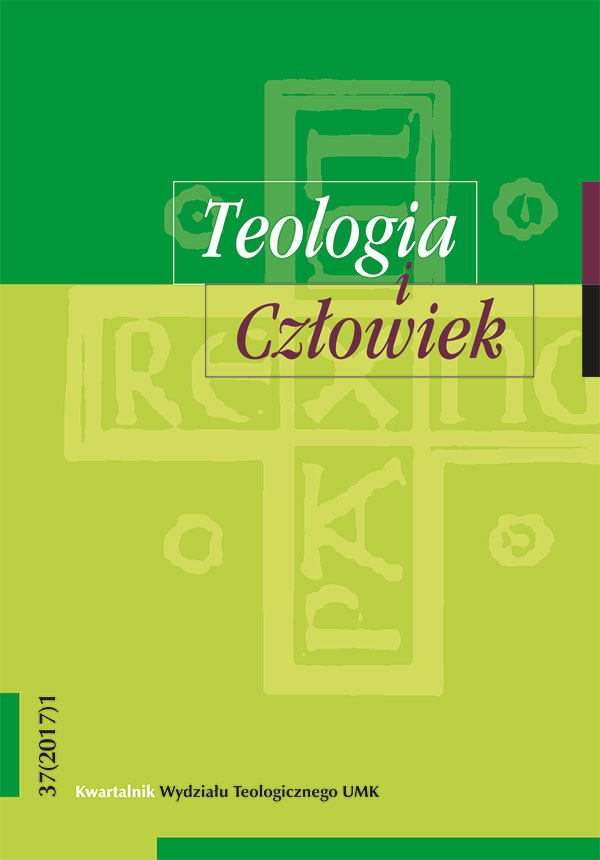Czy głupota jest moralna? Braki w procesie dojrzewania do pełni mądrości na kanwie nauki św. Tomasza z Akwinu o ludzkim poznaniu
DOI:
https://doi.org/10.12775/TiCz.2017.005Słowa kluczowe
poznanie ludzkie, wiedza, cnoty intelektualne, mądrość, głupota, Tomasz z AkwinuAbstrakt
Podczas gdy niektórzy kognitywiści podważają charakter moralny ludzkiego postępowania oraz wskazują na jego deterministyczną zależność od czynników pracy mózgu, trzeba nam na nowo pytać się o etyczność procesu poznawczego. Czy takie pytanie w ogóle jest uprawnione? Często w naukach kognitywnych nie ma już miejsca na etykę i zagadnienia natury moralnej. Św. Tomasz z Akwinu widział człowieka jednak zawsze całościowo: duszę i ciało, jego wiarę i rozum, cnoty intelektualne w łączności z cnotami moralnymi i teologalnymi. Artykuł, wprowadzając kwestię dotyczącą możliwości etycznej odpowiedzialności za głupotę, pragnie wskazać na niektóre zagadnienia etyczne w kontekście budowania procesu poznawczego. Głupota nie jest zatem tylko brakiem inteligencji lub niedorozwoju umysłowego, ale raczej wiąże się z brakiem wewnętrznej spójności władz duszy oraz integracji czynników formujących poszczególne etapy wiedzy. Prawdziwa mądrość jest zawsze mądrością serca.
Bibliografia
Arystoteles, Etyka nikomachejska, Etyka wielka, Etyka eudemejska, O cnotach i wadach, w: Dzieła wszystkie, t. 5, Wydawnictwo Naukowe PWN, Warszawa 1996.
Benedykt XVI, Wolni od pychy intelektualnej dążymy do prawdziwej Mądrości (Przemowienie do wykładowcow i studentow rzymskich uczelni kościelnych), L’Osservatore Romano, 30 (2009) 1/309, s. 38–39.
Jan Paweł II, Dar Mądrości, L’Osservatore Romano, 10 (1989) 4/112, s. 8.
Judycki S., Umysł i synteza. Argument przeciwko naturalistycznym teoriom umysłu, Lublin 1995.
Kalinowski J., Arystotelesowska teoria sprawności intelektualnych, czyli o dwu pojęciach mądrości, „Roczniki Teologiczno-Kanoniczne” 5 (1955–1957) 4, s. 45–65.
Mazur P.S., Imiona intelektu, KUL, Lublin 2004.
Mroz M., Teologiczne podłoże odzyskiwania wartości, „Ateneum Kapłańskie” 129 (1997), 2–3 (531–532), s. 163–174.
Mroz M., Nowa lekcja mistrza Tomasza o mądrości. Refleksje na kanwie encykliki „Fides et ratio”, w: Polska filozofia wobec encykliki „Fides et ratio”, red. M. Grabowski, Toruń 1999, s. 153–171.
Mroz M., Miejsce nauczyciela w procesie edukacji ucznia w świetle traktatu „De magistro” św. Tomasza z Akwinu, „Paedagogia Christiana” 1 (1997), s. 101–120.
Mroz M., Człowiek w dynamizmie cnoty, Toruń 2001.
Penczek M., Wola i intelekt w filozofii Tomasza z Akwinu, Krakow 2012.
Salij J., Mądrość i głupota, w: Eseje tomistyczne, Poznań 1998, s. 40–51.
Swieżawski S., Św. Tomasz na nowo odczytany, Poznań 1995.
Swieżawski S., Centralne zagadnienie tomistycznej nauki o duszy (Commensuratio animae ad hc corpus), „Przegląd filozoficzny” 46 (1948) 1–3, s. 131–191.
Tomasz z Akwinu, O cnotach rozumu. Komentarz do VI księgi Etyki nikomachejskiej Arystotelesa, tłum. M. Głowala, J. Kostaś, M. Otlewska, w: Ziołkowski, , Wrocław 2010.
Tomasz z Akwinu, O darze mądrości (II–II, q. 45), w: Suma teologiczna, t. 16: Miłość (II–II, qq. 23–46), tłum. A. Głażewski, Londyn 1967.
Tomasz z Akwinu, O głupocie (q. 46), w: Suma teologiczna, t. 16: Miłość, tłum. A. Głażewski, Londyn 1967.
Tomasz z Akwinu, O cnotach umysłowych (q. 57), w: Suma teologiczna, t. 11: Sprawności (I–II, q. 49–70), Londyn 1965.
S. Thomae de Aquino, Summa Theologiae, Cinisello Balsamo (Milano) 1988.
Żegleń U., Filozofia umysłu: dyskusja z naturalistycznymi koncepcjami umysłu, Toruń 2003.
Pobrania
Opublikowane
Jak cytować
Numer
Dział
Licencja
CC BY ND 4.0. Posiadaczem prawa autorskiego (Licencjodawcą) jest Autor, który na mocy umowy licencyjnej udziela nieodpłatnie prawa do eksploatacji dzieła na polach wskazanych w umowie.
- Licencjodawca udziela Licencjobiorcy licencji niewyłącznej na korzystanie z Utworu/przedmiotu prawa pokrewnego w następujących polach eksploatacji: a) utrwalanie Utworu/przedmiotu prawa pokrewnego; b) reprodukowanie (zwielokrotnienie) Utworu/przedmiotu prawa pokrewnego drukiem i techniką cyfrową (e-book, audiobook); c) wprowadzania do obrotu egzemplarzy zwielokrotnionego Utworu/przedmiotu prawa pokrewnego; d) wprowadzenie Utworu/przedmiotu prawa pokrewnego do pamięci komputera; e) rozpowszechnianie utworu w wersji elektronicznej w formule open access na licencji Creative Commons (CC BY-ND 3.0) poprzez platformę cyfrową Wydawnictwa Naukowego UMK oraz repozytorium UMK.
- Korzystanie przez Licencjobiorcę z utrwalonego Utworu ww. polach nie jest ograniczone czasowo ilościowo i terytorialnie.
- Licencjodawca udziela Licencjobiorcy licencji do Utworu/przedmiotu prawa pokrewnego nieodpłatnie na czas nieokreślony
PEŁEN TEKST UMOWY LICENCYJNEJ >>
Statystyki
Liczba wyświetleń i pobrań: 555
Liczba cytowań: 0



